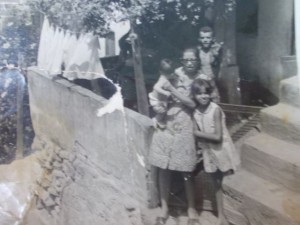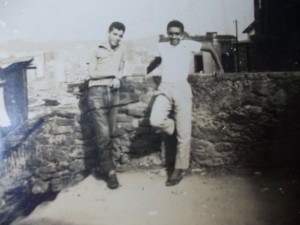 This is the story of my family from Morro da Providência. Despite the city’s repeated interference, we have managed to stay in the same place since we arrived here. And so begins the story of Bernardino and Aurora….
This is the story of my family from Morro da Providência. Despite the city’s repeated interference, we have managed to stay in the same place since we arrived here. And so begins the story of Bernardino and Aurora….
They came to Rio de Janeiro in 1942, and settled on Morro da Providência, where Bernardino found land he could afford. Bernardino tells his grandchildren how they came from the Northeast by ship during World War II, taking the risk that their boat would be fired on by German submarines, which were attacking ships along the Brazilian coast. When they arrived, he was about 32 years old and already retired due to a streetcar accident in Alagoas. Aurora was 22. They built their home here, were married and had 12 children.
In a very small, simple stucco house, Bernardino begins his life story by describing the special difficulties of living in this place at that time. Imagine transporting everything you need to build a house up a long, steep staircase like the one in Providência. They would line up friends and family from one end of the stairs to the other so they could get all the construction materials – bricks, sand, rock, etc. – to the top without wearing anybody out. It has been more than 70 years of struggle and difficulty. Everything that exists today at number 241 Ladeira do Barroso is the result of the sweat, physical effort, and savings of my grandfather, his children and grandchildren. And we can’t forget all the friends and neighbors who are also a part of this story.
In this story, all 12 children and many of the grandchildren and great-grandchildren were born and raised here. Today 8 of our families live here: 4 of Bernardino and Aurora’s children, 7 grandchildren, 3 great-grandchildren – and their spouses. When we get together for birthdays, anniversaries, and the holidays at the end of the year, there are usually around 33 of us.
 We are not against progress in Morro da Providência. But we want to be a part of this progress, to have a place to live that’s comparable to what we have now, in the same area, since our whole life revolves around this neighborhood: school, market, work, church, among other things. Not to mention the difficulties we have with our family members who are bedridden and need constant daily care.
We are not against progress in Morro da Providência. But we want to be a part of this progress, to have a place to live that’s comparable to what we have now, in the same area, since our whole life revolves around this neighborhood: school, market, work, church, among other things. Not to mention the difficulties we have with our family members who are bedridden and need constant daily care.
We have tried several times to negotiate with the Municipal Secretary of Housing (SMH) at home and at the SMH building, but our negotiations have never left the realm of promises and verbal answers. What the city is offering does not meet our needs. The city’s proposals: temporary subsidized rent until new residential apartments are built; cash compensation for our homes; or assistance in purchasing an apartment far from our neighborhood, in places such as Santa Cruz, Senador Camará, and Bangu.
The offer of subsidized rent is not viable, since the amount the city would contribute is much less than the local cost of rent. Also, what the city is offering in compensation is not even enough to buy a kitchenette anywhere near Providência. And the assisted purchase program has already caused endless trouble for a Providência family that bought property from a third party who wasn’t the actual owner. The matter is still not resolved. Keep in mind how difficult it is to find something livable for the amount the city is offering.
 For political and financial reasons, the city has already demolished several houses along the staircase, and it wants to demolish not only our family’s buildings, but also all these years of our family history. We are people who have fought for our rights like any other citizens of Rio. We want equal housing rights. Only those who live here truly understand the needs of the community. It doesn’t help to come up here, build a cable car, and think that everything is going to change and improve. The city keeps saying that the Porto Maravilha and Morar Carioca construction projects will bring the city together. The only “bringing together” we have observed is the bringing together of the city and the tourists – these projects don’t help to integrate the citizens of Rio who live in this community or others like it. That’s not what the city government is interested in.
For political and financial reasons, the city has already demolished several houses along the staircase, and it wants to demolish not only our family’s buildings, but also all these years of our family history. We are people who have fought for our rights like any other citizens of Rio. We want equal housing rights. Only those who live here truly understand the needs of the community. It doesn’t help to come up here, build a cable car, and think that everything is going to change and improve. The city keeps saying that the Porto Maravilha and Morar Carioca construction projects will bring the city together. The only “bringing together” we have observed is the bringing together of the city and the tourists – these projects don’t help to integrate the citizens of Rio who live in this community or others like it. That’s not what the city government is interested in.
All we want is a new building in exchange for the one we have now, with the same provisions and location. To trade one key for another. This is not our requirement alone, but that of all the residents involved in this struggle.
The demands of all of the residents of Morro da Providência, since the beginning of construction:
- Suitable housing for all on Morro da Providência.
- Information about the project from the city to all residents, with specific information for the eight affected areas.
- Community participation in project planning. The community’s voice should be considered and its position incorporated in project decisions.
- Any necessary relocation should be carried out nearby, and the relocation should only occur upon completion of construction, guaranteeing the keys will be turned over to the resident.
- In case of relocation due to the area being classified as at-risk, we demand an independent technical appraisal. If this appraisal confirms the risk, the community agrees to move to another area nearby upon the completion of new residential units, with the guarantee that the keys will be turned over to the resident. If the appraisal does not confirm the risk, the area should be developed, with the guarantee that the community can stay there.
The city’s intervention in Providência should allow for the following, in this order: 1) residents to stay in their current locations; 2) relocation within the same area; 3) compensation, under special circumstances, only when chosen by the resident.
The family’s history, in photos:
The author maintains a Facebook profile, Ideais de Uma Luta Morro da Providência, to call attention to the facts and occurrences that insiders share about the public works taking place in Providência today.
